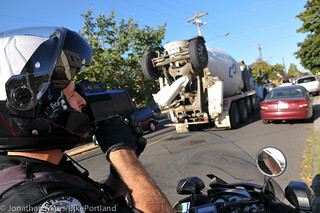
(Photo: J. Maus/BikePortland)
One of the many ways race intersects with transportation is with enforcement of traffic laws. National and local statistics show that black people are stopped and cited for road-use related violations at a higher rate than whites.
In their Unequal Justice series, Investigate West reported, “For everything from jaywalking to driving without a license, it pays to be white in Oregon if you run afoul of the law. What you really don’t want to be is black.”
Now there’s an Oregon law on the books that will give advocates and law enforcement officials new tools to analyze traffic stops and ultimately tackle racial profiling — or as Oregon law enforcement officials refer to it, “bias policing.”
Oregon Governor Kate Brown signed House Bill 2355 into law this week. The law requires the Oregon State Police, the Justice Department and the state’s Criminal Justice Commission to create a standard method of recording traffic stop data. Once officers are trained and the data is recorded (it must begin by July 1st, 2018), agencies must issue annual reports to the Governor, the Department of Public Safety Standards and Training, and the legislature. The law says data must include a person’s race, gender, and the legal justification for the stop. The data will be used, “to identify patterns or practices of profiling.”
HB 2355 builds on an anti-profiling law passed by the legislature in 2015. It passed the House by a vote of 36-23 and the Senate by 20-9.
Support for the bill came from groups as disparate as the NAACP, the Oregon Association of Chiefs of Police and Oregon State Sheriffs Association, and retailer REI.
NAACP Portland Chapter President Jo Ann Hardesty was a vocal supporter of the law. “Why is justice different based on the color of your skin?” she wrote in a letter of testimony for the bill. “It is my hope that over the next few years we will have the political will and the data to make our criminal justice system the envy of the rest of the country.”
Advertisement
And Kevin Campbell with the police chiefs organization said, “Bias policing is not professional policing… Public confidence in the legitimacy of policing and in the work our police officers perform each and every day is absolutely critical to our effectiveness.”
Black residents in particular discussed police harassment as a barrier to bicycling. For many, bicycling felt like an activity that simply makes one too vulnerable to be worth it.
— from BetterBikeShare.org’s Silent barriers to bicycling series.
Beyond basic justice and civil rights, there’s an added reason bicycle advocates should care about this issue. Recent research shows that a major reason black and latino Americans don’t choose to ride bicycles is because they’re afraid of how it makes them more vulnerable to police. As reported in March by BetterBikeShare.org, “Black residents in particular discussed police harassment as a barrier to bicycling. For many, bicycling felt like an activity that simply makes one too vulnerable to be worth it. In fact, participants said that they routinely avoided certain towns and certain routes due to fear of police profiling.” (More on this research was just reported this week by Streetsblog.)
In Portland, advocates are watching the Bureau of Transportation’s number one priority, Vision Zero, to see how it will impact enforcement practices. PBOT’s Vision Zero Action Plan did not recommend more enforcement specifically due to profiling fears. In December 2016 PBOT Director Leah Treat assured City Council that traffic enforcement would not lead to racial profiling. Instead, the agency will use automated enforcement measures like speed and red light cameras.
But in March of this year, at a meeting of the city’s Vision Zero Implementation Task Force, PBOT Commissioner Dan Saltzman made it seem like cameras wouldn’t be enough. “New cameras and speed limits are great,” he said, “but they all must be coupled with more aggressive enforcement.” Saltzman added that his office is working with the Portland Police Bureau and Multnomah County judges to, “work out some solutions in that regard.”
One issue is that PBOT wants to focus their safety work on neighborhoods with deadly roads that have been identified in their High Crash Network — and many of those run through places with a higher number of black and latino residents.
At that meeting back in March, Task Force member and Executive Director of the Black Parent Initiative Charles McGee, said, “We want to make sure when we’re patrolling that we’re not oversaturing certain communities.”
— Jonathan Maus: (503) 706-8804, @jonathan_maus on Twitter and jonathan@bikeportland.org
Never miss a story. Sign-up for the daily BP Headlines email.
BikePortland needs your support.


